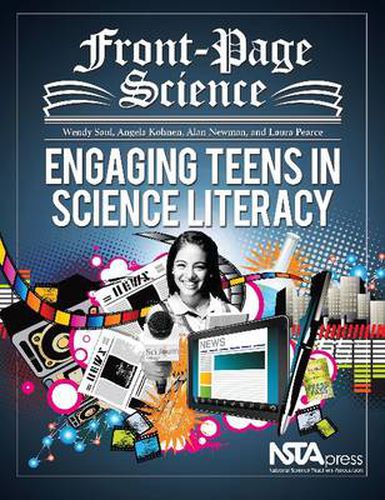Readings Newsletter
Become a Readings Member to make your shopping experience even easier.
Sign in or sign up for free!
You’re not far away from qualifying for FREE standard shipping within Australia
You’ve qualified for FREE standard shipping within Australia
The cart is loading…






The U.S. Preventative Services Task Force issued new guidelines for mammograms in 2009. What does this mean for someone with a family history of breast cancer? Congress periodically votes on a piece of legislation called the Farm Bill. What does its current iteration mean for the safety of supermarket eggs? Understanding how the latest science affects real people patients, consumers, voters, and taxpayers is at the heart of science literacy. From Chapter 1 of Front-Page Science Like citizen journalists, your students can get to the heart of science literacy and challenging questions like these with the learn by doing methodology in this innovative book. Front-Page Science uses science journalism techniques to help students become better consumers of, and contributors to, a scientifically literate community. The book is divided into three parts: Background information and a rationale for using science journalism techniques Concrete advice about how to teach science literacy in this framework from helping students find story angles to teaching search strategies and interview techniques The process of putting together and writing a news story, including how to get students started, help them when they re stalled, and respond to their drafts A free website provides downloadable lesson plans, teacher suggestions, and a forum for exchanging ideas with others. Like Front-Page Science, the website is part of the National Science Foundation funded Science Literacy Through Science Journalism project. By making full use of these rich resources, you ll teach your students skills that will help them make sense of their world not just now, but also after graduation and for years to come.
$9.00 standard shipping within Australia
FREE standard shipping within Australia for orders over $100.00
Express & International shipping calculated at checkout
The U.S. Preventative Services Task Force issued new guidelines for mammograms in 2009. What does this mean for someone with a family history of breast cancer? Congress periodically votes on a piece of legislation called the Farm Bill. What does its current iteration mean for the safety of supermarket eggs? Understanding how the latest science affects real people patients, consumers, voters, and taxpayers is at the heart of science literacy. From Chapter 1 of Front-Page Science Like citizen journalists, your students can get to the heart of science literacy and challenging questions like these with the learn by doing methodology in this innovative book. Front-Page Science uses science journalism techniques to help students become better consumers of, and contributors to, a scientifically literate community. The book is divided into three parts: Background information and a rationale for using science journalism techniques Concrete advice about how to teach science literacy in this framework from helping students find story angles to teaching search strategies and interview techniques The process of putting together and writing a news story, including how to get students started, help them when they re stalled, and respond to their drafts A free website provides downloadable lesson plans, teacher suggestions, and a forum for exchanging ideas with others. Like Front-Page Science, the website is part of the National Science Foundation funded Science Literacy Through Science Journalism project. By making full use of these rich resources, you ll teach your students skills that will help them make sense of their world not just now, but also after graduation and for years to come.